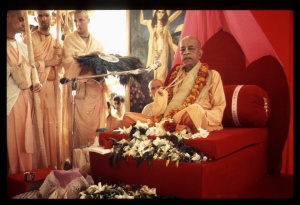BG 6.36 (1972): Difference between revisions
(Vanibot #0020 edit - link to the Version Compare feature) |
Yadasampati (talk | contribs) No edit summary |
||
| Line 1: | Line 1: | ||
[[Category:Bhagavad-gita As It Is (1972) - Chapter 06]] | [[Category:Bhagavad-gita As It Is (1972) - Chapter 06]] | ||
<div style="float:left">'''[[Bhagavad-gita As It Is (1972)]] - [[BG 6 (1972)|Chapter 6: | <div style="float:left">'''[[Bhagavad-gita As It Is (1972)]] - [[BG 6 (1972)|Chapter 6: Sāṅkhya-yoga]]'''</div> | ||
<div style="float:right">[[File:Go-previous.png|link=BG 6.35 (1972)]] '''[[BG 6.35 (1972)]] - [[BG 6.37 (1972)]]''' [[File:Go-next.png|link=BG 6.37 (1972)]]</div> | <div style="float:right">[[File:Go-previous.png|link=BG 6.35 (1972)]] '''[[BG 6.35 (1972)]] - [[BG 6.37 (1972)]]''' [[File:Go-next.png|link=BG 6.37 (1972)]]</div> | ||
{{CompareVersions|BG|6.36|BG 1972|BG 1983+}} | {{CompareVersions|BG|6.36|BG 1972|BG 1983+}} | ||
Latest revision as of 06:14, 22 April 2024

A.C. Bhaktivedanta Swami Prabhupada
TEXT 36
- असंयतात्मना योगो दुष्प्राप इति मे मतिः ।
- वश्यात्मना तु यतता शक्योऽवाप्तुमुपायतः ॥३६॥
- asaṁyatātmanā yogo
- duṣprāpa iti me matiḥ
- vaśyātmanā tu yatatā
- śakyo 'vāptum upāyataḥ
SYNONYMS
asaṁyata—unbridled; ātmanā—by the mind; yogaḥ—self-realization; duṣprāpaḥ—difficult to obtain; iti—thus; me—My; matiḥ—opinion; vaśya—controlled; ātmanā—by the mind; tu—but; yatatā—while endeavoring; śakyaḥ—practical; avāptum—to achieve; upāyataḥ—appropriate means.
TRANSLATION
For one whose mind is unbridled, self-realization is difficult work. But he whose mind is controlled and who strives by right means is assured of success. That is My opinion.
PURPORT
The Supreme Personality of Godhead declares that one who does not accept the proper treatment to detach the mind from material engagement can hardly achieve success in self-realization. Trying to practice yoga while engaging the mind in material enjoyment is like trying to ignite a fire while pouring water on it. Similarly, yoga practice without mental control is a waste of time. Such a show of yoga practice may be materially lucrative, but it is useless as far as spiritual realization is concerned. Therefore, the mind must be controlled by engaging it constantly in the transcendental loving service of the Lord. Unless one is engaged in Kṛṣṇa consciousness, he cannot steadily control the mind. A Kṛṣṇa conscious person easily achieves the result of yoga practice without separate endeavor, but a yoga practitioner cannot achieve success without becoming Kṛṣṇa conscious.